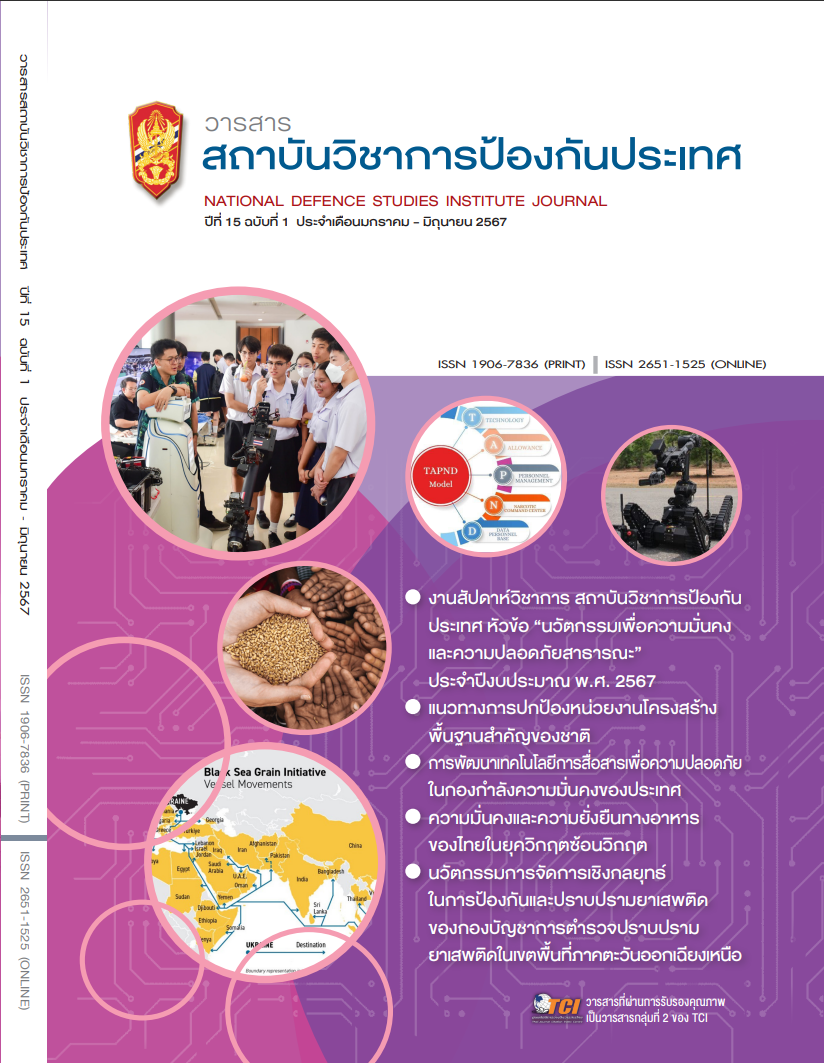The Development of Air Force Officer’s Good Leadership in The Squadron Officer School
Main Article Content
Abstract
This research aims 1) to analyze the problems and needs in developing good leadership, 2) to analyze the components for developing good leadership, 3) to examine and develop a pattern for developing good leadership, and 4) to create a guideline for developing good leadership for military officers at the Squadron Officer School. The research employed both quantitative and qualitative research methods. Independent variable is the leadership component and leadership characteristics. Dependent variable is the leadership skills development and qualitative research interview about leadership development. The sample group consisted of 300 military officers undergoing training at the Squadron Officer School and evaluate the manual for developing good leadership as well as 11 experts and administrators. They served as assessors for the accuracy of the content in the guideline. The research tools included questionnaires and interviews. Data analysis involves percentages, frequencies, means, standard deviation, confirmatory factor analysis for structural analysis, and content analysis.
The research findings are as follows: 1) the development of good leadership faces issues such as outdated content and a focus on lecturing in some subjects. There is a lack of distinction between management and operational duties during training. Improvement needs include updating content to be more relevant, using real-life scenarios more than lecturing, and teaching that aligns with duties. 2) In analyzing the confirmatory factor analysis and issues of elements leadership Leader characteristics and development of leadership skills, it was found that the factor loadings are between 0.754 and 0.897. The average variance extracted (AVE) ranges from 0.703 to 0.779, indicating good reliability. Construct reliability (CR) values range from 0.90 to 0.959, indicating good reliability. 3) The structural model fits well with the empirical data, as indicated by the Chi-Square value of 103.021, df = 83, Relative Chi-Square = 1.241, p-value = .067, GFI = .964, CFI = .996, AGFI = .925, and RMSEA = .028. Although the Chi-Square value is slightly high, and the p-value is marginally significant; the model is still acceptable. 4) Additionally, a guideline for developing good leadership can be created based on the research findings.
Article Details

This work is licensed under a Creative Commons Attribution-NonCommercial-NoDerivatives 4.0 International License.
The articles, images, tables, graphs, written content, and opinions published in this journal are solely those of the authors and do not necessarily reflect the views or positions of the National Defence Studies Institute or its academic affiliates.
References
กมลชนก ชมภูพันธุ์. (2564). แนวทางการพัฒนาภาวะผู้นำเชิงนวัตกรรมในธุรกิจยุคดิจิทัล. วารสารนวัตกรรมการศึกษา และการวิจัย, 5(1), 148-155.
กองทัพอากาศ, คณะอนุกรรมการส่งเสริมวัฒนธรรมกองทัพอากาศ. (2566). แผนเสริมสร้างวัฒนธรรมองค์กรกองทัพอากาศ พ.ศ. 2566-2570.
กัลยา วานิชย์บัญชา. (2556). การวิเคราะห์สถิติ : สถิติสำหรับการบริหารและวิจัย. กรุงเทพฯ: จุฬาลงกรณ์มหาวิทยาลัย
เกตุชญา วงษ์เพิก. (2564). การพัฒนาภาวะผู้นำเชิงกลยุทธ์ในยุคดิจิทัลสู่องค์การแห่งการเรียนรู้. วารสารนวัตกรรมการศึกษาและการวิจัย, 5(2), 467-478.
จีระยุทธ พุทธรักษาพิทักษ์. (2564). จินตนาการใหม่กับการพัฒนาภาวะผู้นำในยุคโลกเปลี่ยน. วารสารวิชาการแสงอีสาน, 18(1), 22-32.
ชัชนิธิฐา ชัชวาลวงศ์. (2565). หลักพุทธธรรมกับการพัฒนาภาวะผู้นำของเยาวชนในกรุงเทพมหานคร. วารสารสหวิทยาการนวัตกรรมปริทรรศน์, 5(1), 267-272.
ฐปนีย์ นารี. (2561). รูปแบบการพัฒนาภาวะผู้นำครูตามการปฏิรูปการศึกษาในทศวรรษที่ 3 (พ.ศ. 2562-2571) ของโรงเรียนมัธยมศึกษา ในพื้นที่จังหวัดในความรับผิดชอบของสำนักงานศึกษาธิการภาค 11. วารสารวิชาการและวิจัย มหาวิทยาลัยภาคตะวันออกเฉียงเหนือ. 12(1), 144-158.
ณรงค์ อินทชาติ. (2563). จุดเปลี่ยนผ่านของแนวคิดในการพัฒนาภาวะผู้นำในศตวรรษที่ 21 : กรณีศึกษากองทัพสิงคโปร์. วารสารรัฏฐาภิรักษ์, 61(2), 111-121.
ณัฐภรณ์ เอกนราจินดาวัฒน์. (2560). ภาวะผู้นำทางการบริหารการพัฒนา. กรุงเทพฯ: มหาวิทยาลัยราชภัฏสวนสุนันทา.
นฤมล เพ็ญสิริวรรณ. (2561). ภาวะผู้นํากับการพัฒนาองค์กรให้มีประสิทธิภาพสูงสุด . วารสาร มจร. มนุษยศาสตร์ปริทรรศน์, 4(2), 118-124.
อำพล ชัยสารี และนิมิตย์อุดม. (2565). ภาวะผู้นำทางการศึกษาในศตวรรษที่ 21 กับความเชื่อมั่นในตนเอง. Journal of Modern Learning Development, 7(7), 417-435.
พูลพงศ์ สุขสว่าง. (2556). แบบจำลองสมการโครงสร้าง. กรุงเทพฯ: โรงพิมพ์วัฒนาพานิช.
วันดี อภิรักษ์ธนากร. (2565). ภาวะผู้นํา 5 ระดับของ John C. Maxwell (พิมพ์ครั้งที่ 7). กรุงเทพฯ: เนชั่นบุ๊ค.
สำนักนายกรัฐมนตรี, สำนักงานสภาพัฒนาการเศรษฐกิจและสังคมแห่งชาติ. (2565). แผนพัฒนาเศรษฐกิจและสังคมแห่งชาติ ฉบับที่ 13.
ออระญา ปะภาวะเต, และบุญชม ศรีสะอาด. (2564). แนวทางการพัฒนาภาวะผู้นำยุคดิจิทัลของผู้บริหารสถานศึกษา สังกัดสำนักงานเขตพื้นที่การศึกษาประถมศึกษาบุรีรัมย์เขต 2. Journal of Modern Learning Development, 6(4), 193-199.
อัจศรา ประเสริฐสิน. (2557). การวิจัยเชิงประเมินแบบผสานวิธีในรวมบทความวิธีวิทยาและทฤษฎีเพื่อการวิจัยทางพฤติกรรมในองค์กร. กรุงเทพฯ: โรงพิมพ์ไทยสัมพันธ์.
Center for Creative Leadership. (2023). 12 Characteristics of a Good Leader. Retrieved from https:// www.ccl.org/articles/leading-effectively-articles/characteristics-good-leader/
Drouillard, S. E. and Kleiner, B. H. (1996). “Good” leadership. Management Development Review, 9(5), 30-33.
Greenleaf, R. K. (2002). Servant-Leadership: A Journey into the Nature of Legitimate Power and Greatness. New Jersey: Paulist Press.
Hair, J.F., Black, W.C., Babin, B.J. and Anderson, R.E. (2010). Multivariate Data Analysis. 7th Edition, New York: Pearson.
Hellriegel, D., Jackson S. E., Slocum, J. W. (2001). Management: A Competency Based Approach (9th ed.). Boston: Cengage Learning.
Jenkins, A. P. (2018). Operationalizing the Army Learning Strategy in Unit Collective Training. US Army Command and General Staff College.
Ciulla, J. B. (2012). Ethics Effectiveness. In D.V. Day & J. Antonakis (Eds.) The Nature of Good Leadership (p.508-540). Los Angeles, CA: SAGE.
Kirchner, M. J., & Akdere, M. (2019). Exploring inclusion of leadership development into new employee orientations: a proposed approach from army leader development. Organization Management Journal, 16(3), 156-166.
Makgone, S. G. (2012). An evaluation of strategic leadership in selected schools and its contribution to academic performance (Degree of Magister Technology). University of South Africa.
Rovinelli, R. J., & Hambleton, R. K. (1977). On the Use of Content Specialists in the Assessment of Criterion-Referenced Test Item Validity. Tijdschrift Voor Onderwijs Research, 2, 49-60.
Susana, U. (2004). Essentials of Psychological Testing. Canada: John Wiley & Sons, Inc.
Yau, A. A., Cortez, P., & Auguste, B. L. (2022). The Physician Leader: Teaching Leadership in Medicine. Advances in Chronic Kidney Disease. 29(6), 539-545.


